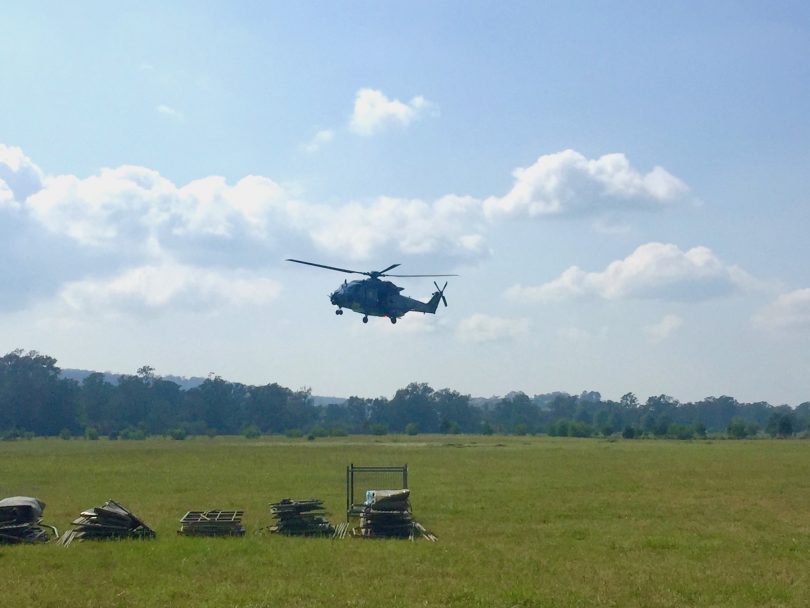
An Air Force MRH90 lands at the Bega Racecourse. Photos: Lisa Herbert.
Around the Bega Valley it’s been hard to miss the increase in air traffic, like the huge MRH 90 RAAF choppers moving personnel and equipment, turning the Old Bega Racecourse into a makeshift airfield.
Manning the gate at the racecourse site is Private McCready, originally from Canberra. “From this position here in Bega we are servicing our engineers and teams from Eden to Nowra,” he explains.
Tasks of the choppers include undertaking fast evacuations, transfer of people, assets and equipment like chainsaws, VIPs and Commanders, and also some aerial reconnaissance as requested by the RFS.
“There are 350 to 400 ADF people here in Bega between the racecourse, the showgrounds, high school as well as out in the field,” Private McCready says.
“We are all very busy each day, assisting the clearing of roads and livestock, dead and injured animals and trees, assisting with rebuilding fences, and also filling water tanks for homes and livestock, and providing transport for fodder going out to scorched farms etc. We’ve probably got 50 to 60 tasks per day.”
Private Winnell was happy to show me around the base, and even showed me her ‘stable’. Many of the troops are camped in the horse yards and stables.
“We have swags, stretchers and use our ‘hoochie’ tents as walls, our Q-store is here with everything we and our teams need. We pick up three meals a day from the team at the showgrounds.
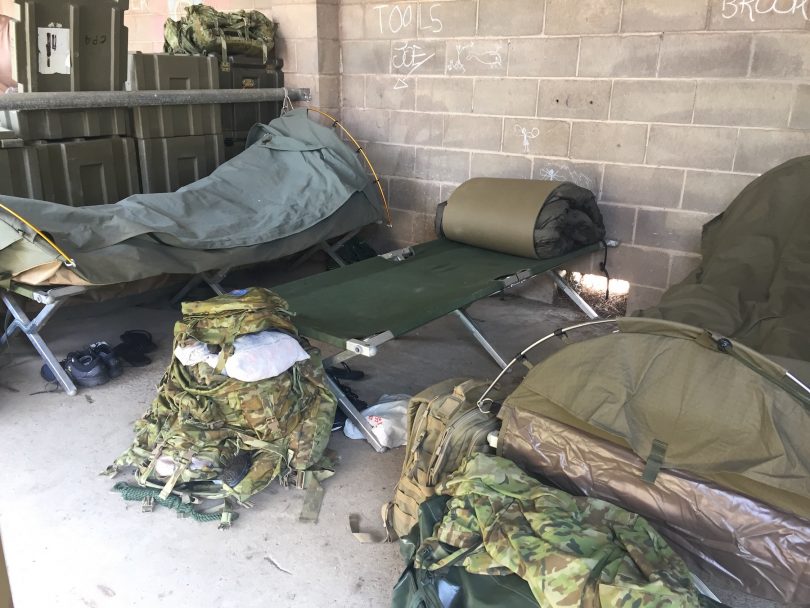
Home away from home, troops have settled into the stables at the Old Bega Racecourse.
“We’re pretty comfortable, and we’re meeting heaps of locals as this is where they come to run their dogs, which is great for morale!
“SIGS Team is here [Signals], the Q-Store, and we supply equipment and support the engineering team. Our Medical team is at the High School.”
Private Davis and Private Appel run the aforementioned Q-Store, perhaps better known to civilians as the Quartermasters Store.
“We’ve been here for 16 days now, and we don’t ever get too comfy or complacent, as we may have to move on,” Private Davis says.
“We’ve got everything our people need here including these protective kits in case we have to deal with dead animals. Most of us are Reserve Army units, many of us having been upgraded to full time for this period.”
At the Bega Showgrounds, Sergeant Sparks has been running the ‘camp’ kitchen.
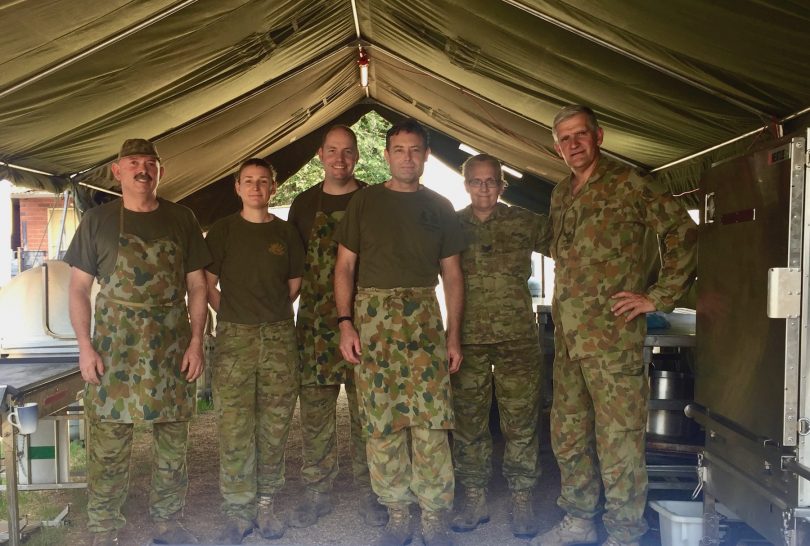
Sergeant Sparks (2nd from Right) and her team of cooks at Bega Showgrounds.
“We have six cooks, and people making salads and other prep. Cooks and caterers are providing meals for defence personnel, three meals per day, always a hot dinner,” she says.
“We were supplying meals for evacuees but that’s dropped a bit and it’s Army meals now.
“When we arrived the evacuation centre was already in full swing. The women out here while the evac centre was running are absolute heroes, it’s been amazing being here. Soon we’ll be rotating with another team and heading up to Lismore and Batemans Bay,” Sgt Sparks says.
“We still have a small number of displaced families and people here at the showgrounds at the moment.”
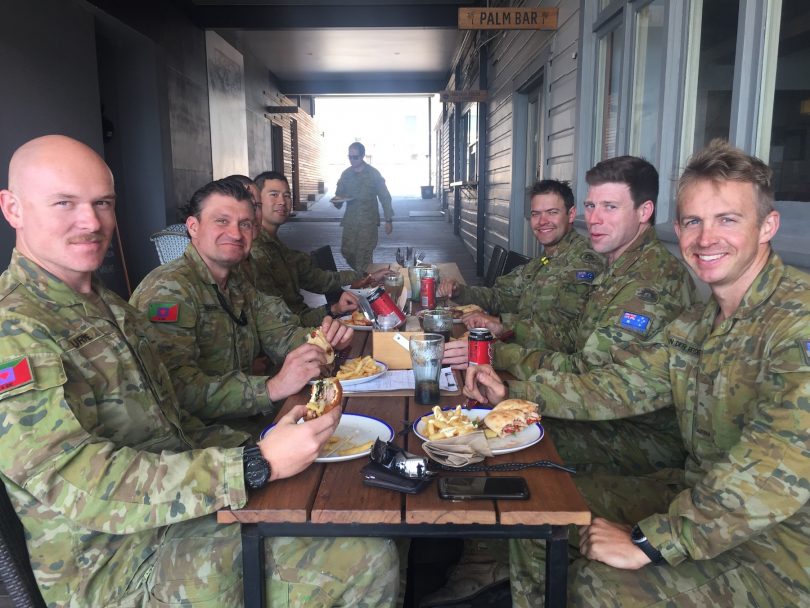
Many ADF personnel get out and spend money in coastal towns as they can.
Captain Eldridge and Sergeant Dunn of CIMIC, the Civil and Military Corporation, look after much of the organisation and gathering/communicating of information between the community and commanders.
“We’re here to support the Emergency Services under the direction of the State Government in two phases: an emergency phase and then, of course, the recovery phase. On the transition to recovery we are helping with stock, fences, trees and roads, all to support the RFS and other services in being able to operate safely.
“Basically our support and services are requested through Council and local recovery centres, and we always make sure these tasks can’t be undertaken by non-government agencies and local contractors first.
“We are not wanting to take jobs from local people, we are always very aware of this. As soon as we can engage a local organisation, we do that.
“We are also not here to assist individual home/property owners in the recovery stage. There is great assistance through the local recovery centres and agencies.”
And as Liaison Officer Tim Dunn also of CIMIC explains: “We get our info from Councils, State Governments and by talking to locals. The moment the community can totally support itself we remove ourselves.”
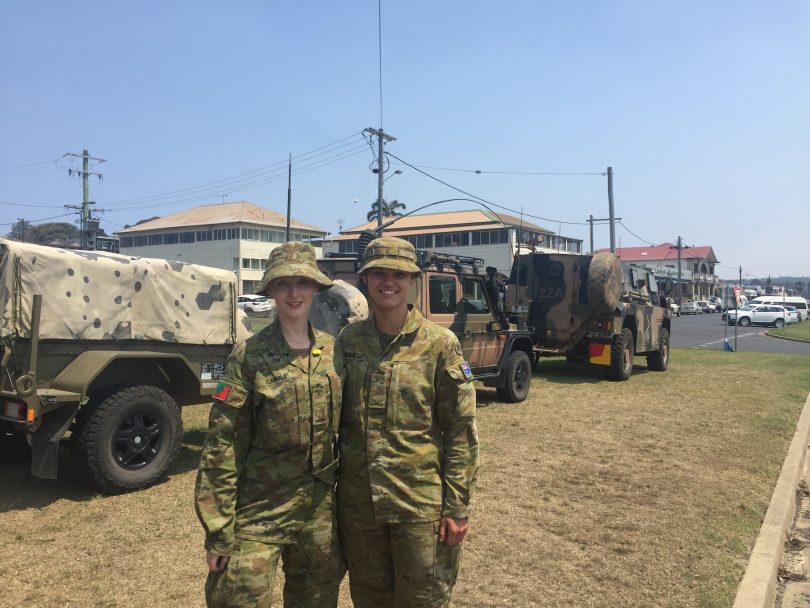
Privates Cantle (Medic) and Invers (Driver) – “People are really welcoming and grateful”.
Original Article published by Lisa Herbert on About Regional.












